|
|
|
|
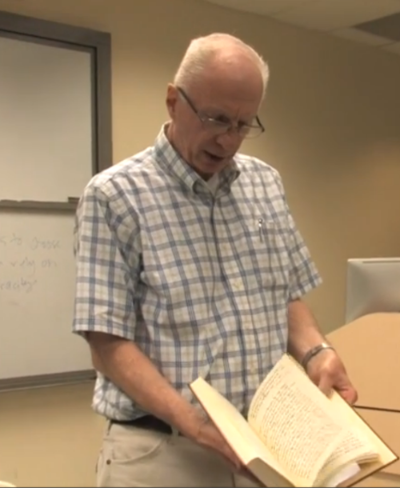
|
|
Etruscan William Heyen discusses his journaling process with Wilkes students.
|
|
On Writing: Heyen Journals His Life
|
|
|
by Danie Watson
“When I look at my old entries, I realize how much life wouldn’t have
been recorded, would have been completely forgotten, except for my
journal,” says William Heyen, author of The Candle: Poems of Our 20th Century Holocausts, which hits shelves on November 15, 2016. The Candle is Heyen’s sixth Etruscan title.
In addition to writing books of poetry and books in other genres,
editing and contributing to hundreds of anthologies, and serving as a
Fulbright lecturer in Germany, Heyen also keeps a daily journal, three
volumes of which have been published by H_NGM_N Press.
Heyen received his first journal as a gift from his wife as a Christmas
present, over fifty years ago, and has been journaling ever since. He
says, “[Journaling] keeps track of me, and often composes me.”
Each journal entry Heyen writes can surround his innermost thoughts, or
even what he did that day. He doesn’t carry his journal with him all the
time, but always knows where it is, and he says that he watches over it
just as much as his wife or his grandkids.
Heyen does not use his journal as a writing notebook to prompt poems or
stories, but rather a place to organize his thoughts, and emphasize what
his priorities should be. “[The journal] reminds me of time, and how
lucky I’ve been to have the life I’ve had—love, teaching, writing,
earthquake and flood and fire free—and to have met the writers I’ve
met,” he says.
When asked what role journaling plays in his writing process, Heyen
says, “The journal keeps everything company. I’ve learned how to free
myself toward getting words down. The point of my journal, in my mind,
is part of the wholeness of my whole writing life.”
Thinking about his journal as a companion, Heyen calls out the word
journal itself. “What’s in the middle of the word journal? Urn. I see it
as future ashes, or something that we can revere.”
As for what he writes in the journal, Heyen says he isn’t worried about
the type of language he uses. He sits down in his writing shack in his
backyard, in Brockport, New York and writes the date, followed by
whatever comes to mind. He says he never wants to think that he has to
wait until he has something important to say before he begins cursive
communion with his companion, his journal.
After he finishes a journal, Heyen takes the completed book to one of
his friends who works at the UPS Store, and he gets two spiral-bound
copies made. He keeps one of the copies in a garden shed, and one in his
writing cabin at the back of his Brockport acre. “I’d be more than glum
if I lost one of these notebooks. From the time I drop a notebook
off at the store, until it’s copied for me in a day or three, I’m
nervous. ‘Guard this with your life,’ I say to my pal Ron, who watches
over it.”
Even as his current journals are copied and stored, Heyen is typing up
his older volumes for publication. Right now, he's up to the year 1999
in his typing. He says that it takes him two to three years to type up
one of the giant journal volumes that Nate Pritts is publishing at his
H_NGM_AN Press. Pritts is a former student of Heyen’s who took on the
lifelong commitment to publish Heyen’s journals. Each of the three
journals published so far is about 550 pages. However, Heyen does not
edit his journals. “As I type, I’m letting it all be what it is. Maybe
I’ll add a last name, or fix a spelling error, but I will not try to
sanitize myself,” Heyen says.
“For those who are looking to begin a journal, “ Heyen says, “do what I
do: open your notebook, put the date down, and write
something—anything.” Heyen urges writers to do what makes them
comfortable, in what they’re writing, how they’re writing it, and even
what the journal looks like. “Over the long run your journal will
become what you want it to be and what it wants to be. Don’t censor
yourself and think about who might be reading what you’re writing.”
Heyen’s journals are his companions through everything. “If I were on
that proverbial desert island and could only have certain of my own
books with me, I think I’d chose my journals, the life therein as lived,
and not books of poetry.“
The Candle: Poems from Our 20th Century Holocausts is available for now in paperback.
Danie Watson is pursuing her M.A. in creative nonfiction from Wilkes
University and serves as a graduate assistant with Etruscan Press. She
currently resides in Nanticoke, Pennsylvania.
|
|
New Releases from Etruscan
|
|
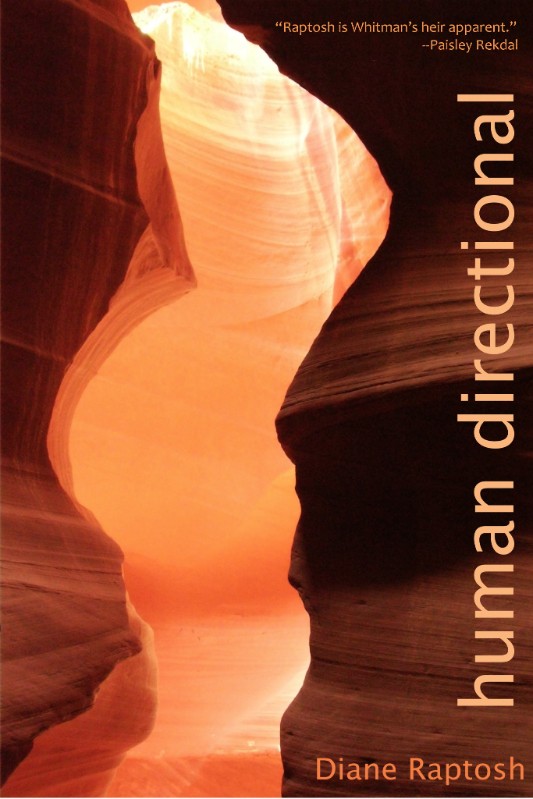
|
Human Directional by Diane Raptosh
Etruscan Press is proud to publish the fifth book of poetry from Diane
Raptosh, the first Boise Poet Laureate and Idaho Writer-in-Residence.
Raptosh’s Human Directional has received praise from Paisley Rekdal, author of Animal Eye (University of Pittsburgh Press, 2012) naming Raptosh as “Whitman’s heir apparent.” Human Directional is
a poetic celebration of body and beauty, justice and possibility,
difference and community, and revels in the ecstatic multiplicity of
being, as well as visiting and revisiting boundaries between the self
and others. Human Directional may be read as the second part of a trilogy, following American Amnesiac (Etruscan Press, 2013), with the third part being a verse biography of newly conceived states. American Amnesiac was longlisted for the National Book Award, and named a finalist for the 2014 Housatonic Book Award. Each poem in Human Directional reveals the heartbreak of our world by exploring—and often exploding—its most sacred memes.
|
|
|
|
The Candle: Poems of Our 20th Century Holocausts by William Heyen
We are pleased to publish another title from William Heyen, one of our
flagship authors. Heyen, who is the author of four previous Etruscan
titles, has penned a new collection of poetry, The Candle: Poems of Our 20th Century Holocausts. Mihaela Moscaliuc, author of Immigrant Model (University
of Pittsburgh Press, 2015) says, “each votive poem is a prayer for the
departed as much as an elegy for the living, a trembling for the fate of
us all.” The Candle is a collection of about 150 poems from eight previous books, and concludes with a collection of 46 new poems.
|
|
|
Seibles announced Poet Laureate of Virginia
|
|
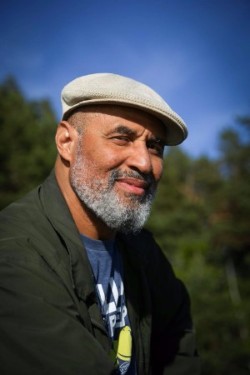
|
|
Seibles was appointed Poet Laureate of Virginia by Governor Terry McAuliffe.
|
|
|
Tim Seibles, author of both Fast Animal (Etruscan Press, 2011) and the forthcoming book of poetry One Turn Around the Sun (Etruscan Press, 2017) has been appointed Poet Laureate of Virginia by Governor Terry McAuliffe.
Seibles teaches at Old Dominion University, the Muse Writers Workshop,
and the University of Southern Maine Stonecoast M.F.A. in Writing
Program, and serves as an Advisory Board member for the Wilkes
University Graduate Creative Writing Program. He has received
fellowships from both the Provincetown Fine Arts Center and The National
Endowment for the Arts. Fast Animal was nominated for a
National Book Award and received the PEN Oakland Josephine Miles Award
as well as the Theodore Roethke Memorial Poetry Prize in 2014.
Seibles lives in Norfolk, Virginia and presents his work both nationally
and internationally at universities, high schools, cultural centers,
and literary festivals.
Congratulations from all of us at Etruscan Press.
|
|
Outreach Program Hosts International Writers
|
|
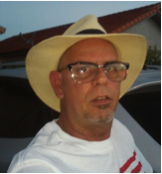 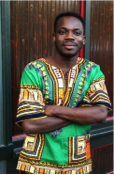
Raul Hernandez (left) and D. M. Aderibigbe (right).
|
|
|
On December 5-8, Etruscan Press and
the YSU Poetry Center Outreach Program will host two international
writers, Raul Hernandez from Cuba and D.M. Aderibigbe from Nigeria. Both
authors will meet and work with students at Youngstown State
University, East High, Early College, the Choffin Career Center and
Chaney High, as well as community members at Park Vista Retirement Home.
Author of fourteen books of poetry, fiction and children’s literature,
Raúl Hernández is one of the most important Cuban writers of his generation. He was director of the publishing house Unicornio and the magazine Habáname. He works as a news editor for Telemundo 51, one of the most important Hispanic television networks in South Florida.
D.M. Aderibigbe studied at the University of Lagos and received an
M.F.A. from Boston University, where he received the Robert Pinsky
Global Fellowship. His work has appeared in Prairie Schooner, the Colorado Review, the Notre Dame Review, and many other journals. His chapbook, In Praise of Our Absent Father, is included in 8 New Generation African Poets.
Both Hernandez and Aderibigbe will present a panel, open to the public,
in the English Department in Debartolo Hall on “International Conflict
and the Arts” at 6:00 p.m. on Tuesday, December 6, 2016.
Since 2008, The Poetry Center and Etruscan Outreach Program has brought
seventeen national and international writers and their books to
thousands of students and community members in the Valley.
|
|
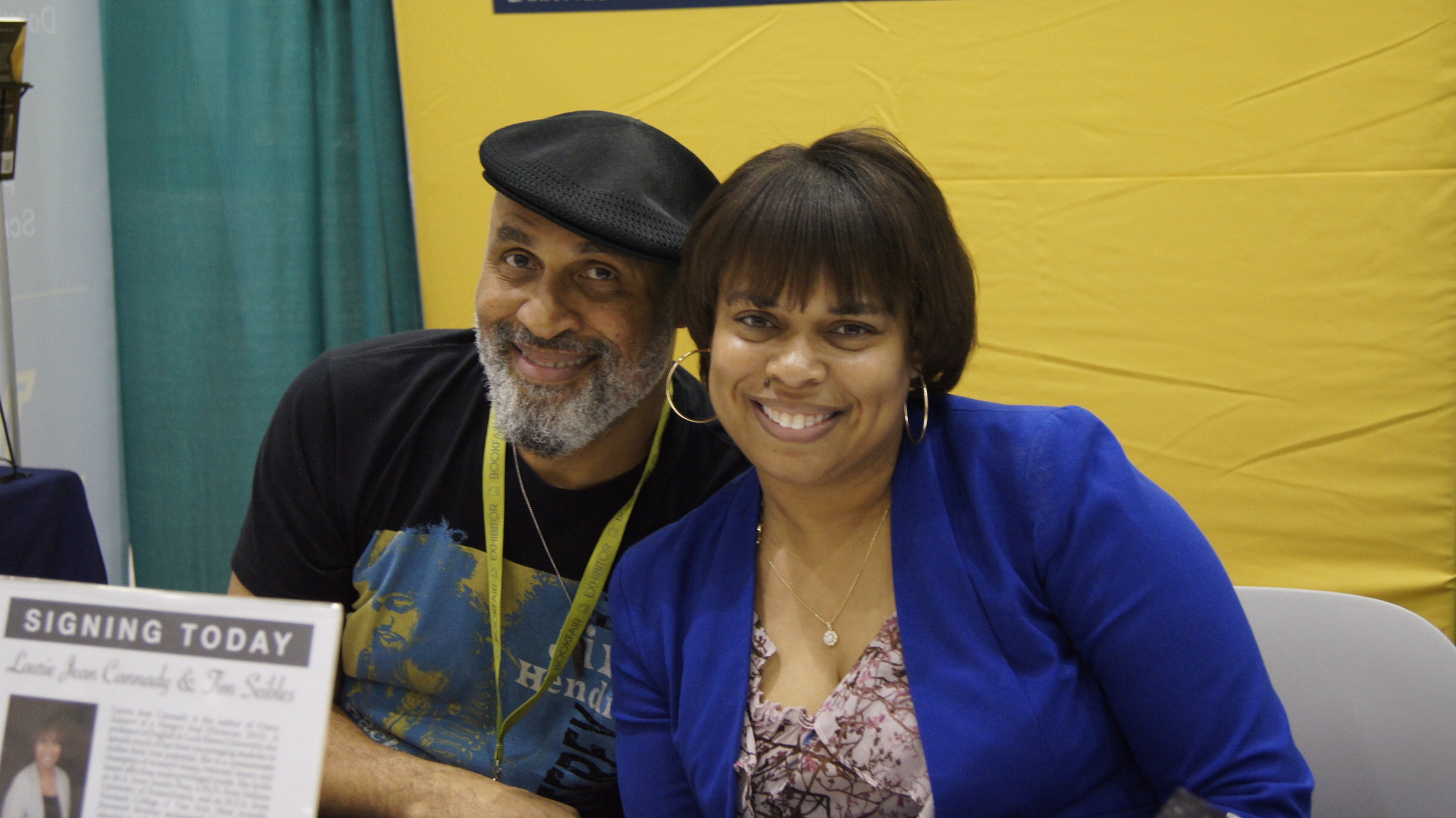
|
|
Tim Seibles (left) and Laurie Jean Cannady (right) sign books at AWP16.
|
|
|
Etruscan Press is once again exhibiting at
the Association of Writers and Writing Programs Conference (AWP), which
will be held in Washington, DC, from February 8-11, 2017. Partnering
with the Wilkes University Graduate Creative Writing Program, Etruscan
will host author signings during the Bookfair in booth (402). For more
information about our book signings, panels, and readings, please visit our website.
|
|
About Etruscan Press:
Housed at Wilkes University and partnering with Youngstown State
University, Etruscan is a non-profit literary press working to produce
and promote books that nurture the dialogue among genres, cultures, and
voices.
For the latest Etruscan events, please visit our website.
Follow us:
Want more Etruscan updates? Follow our Facebook page Etruscan Press, and our Twitter account @etruscan_press for AWP announcements, author events, and more.
|
|
|
|
|
|
|
|
|